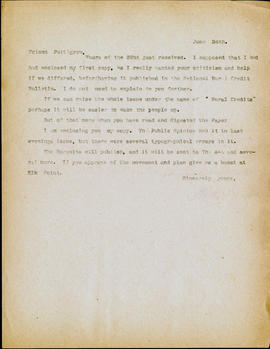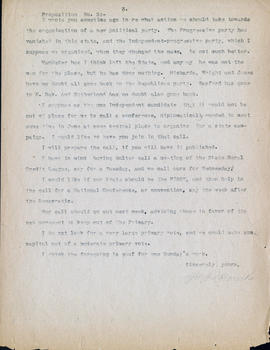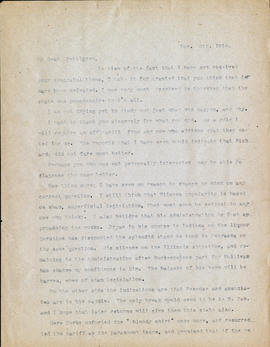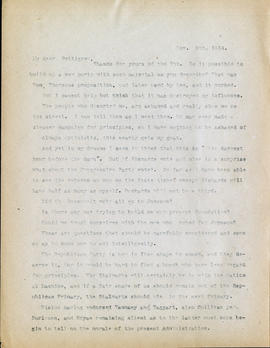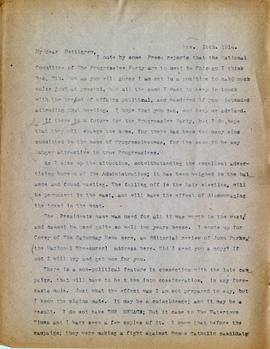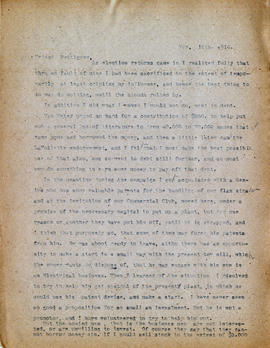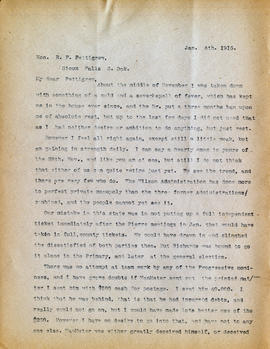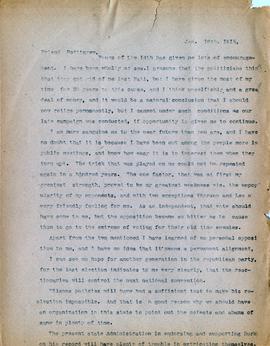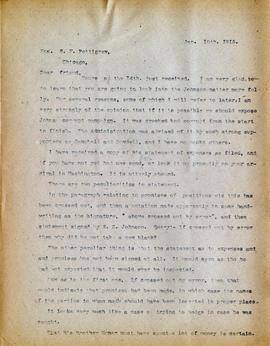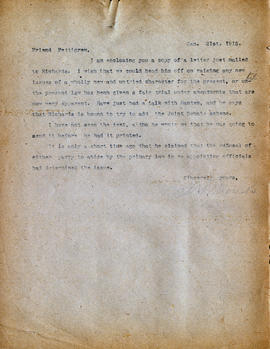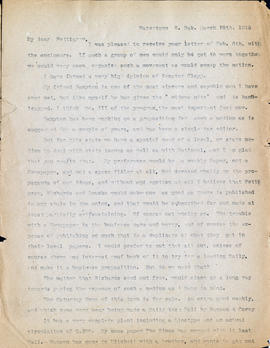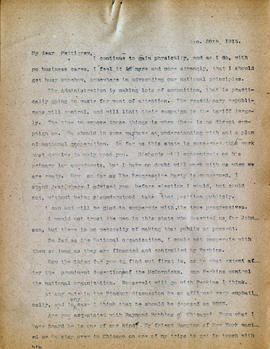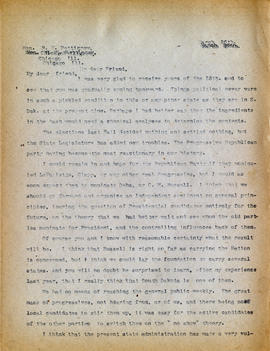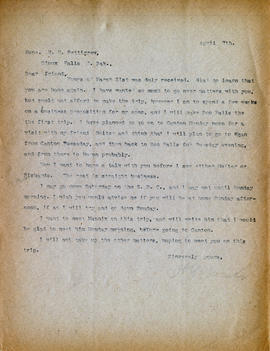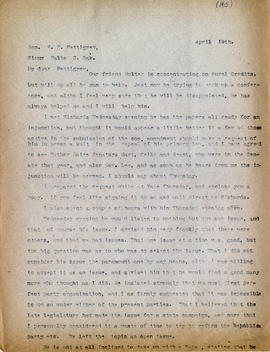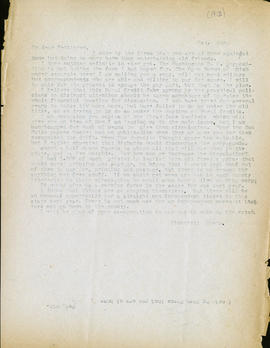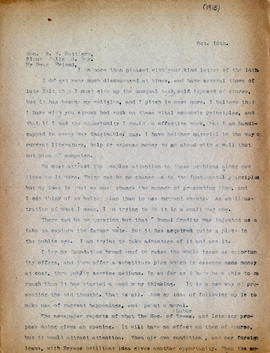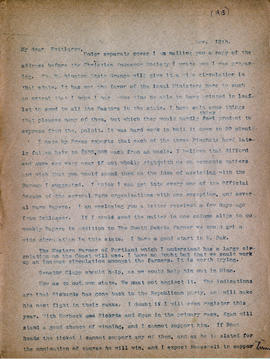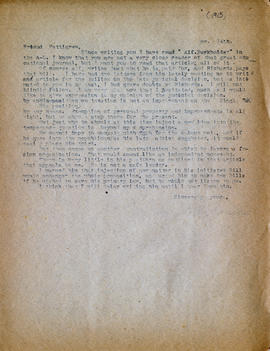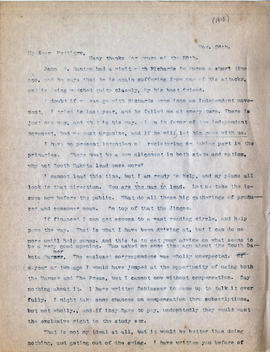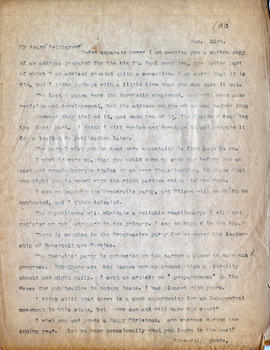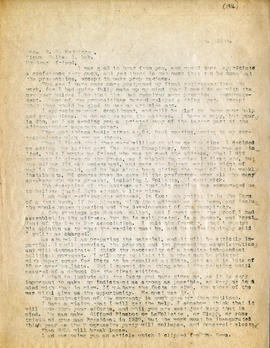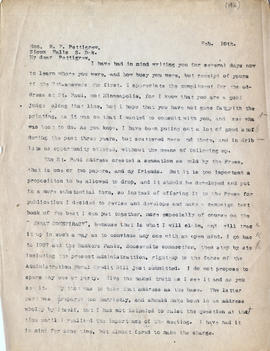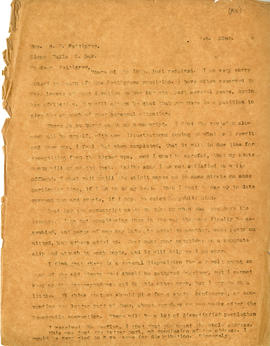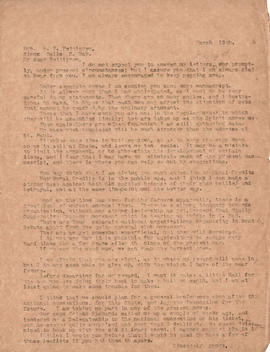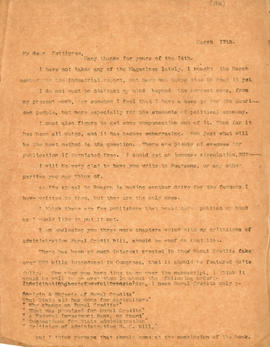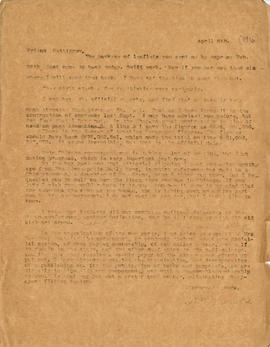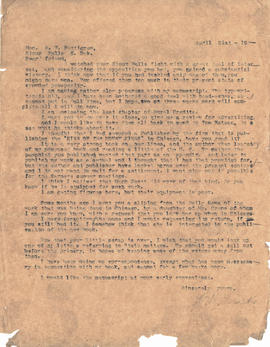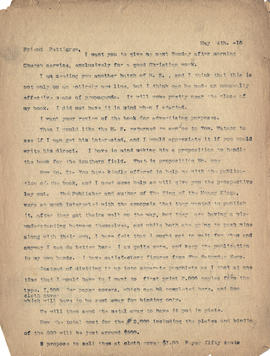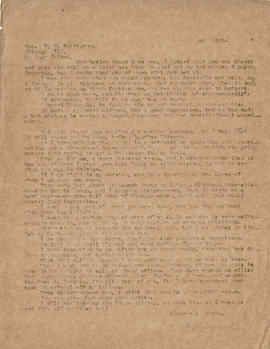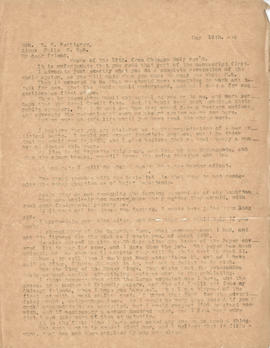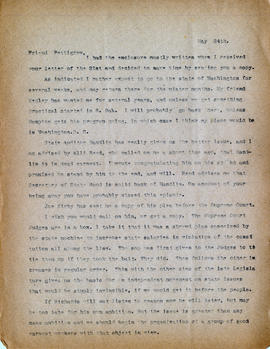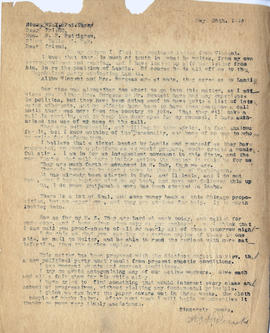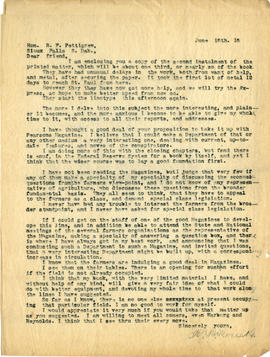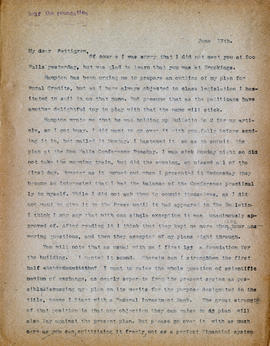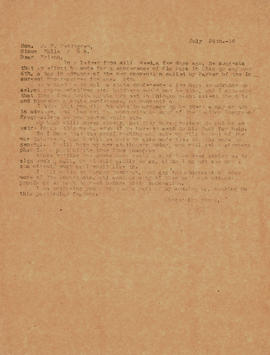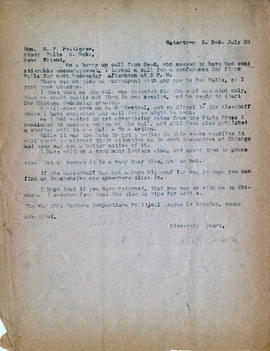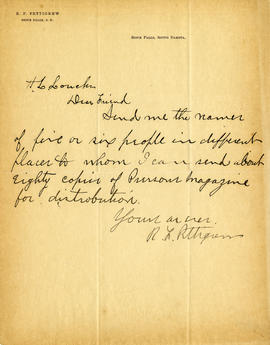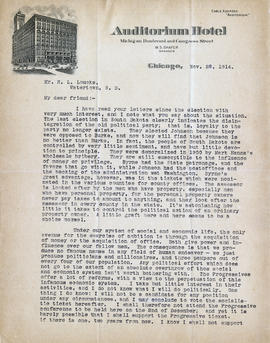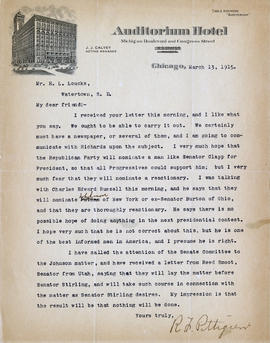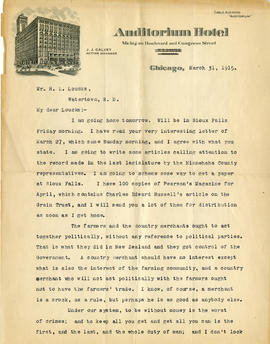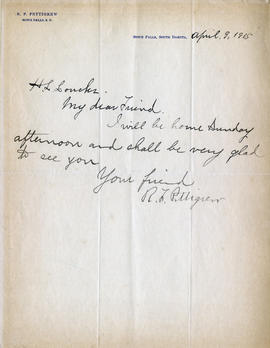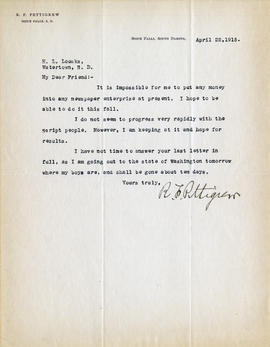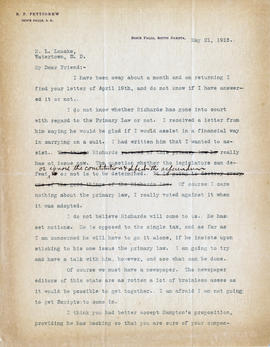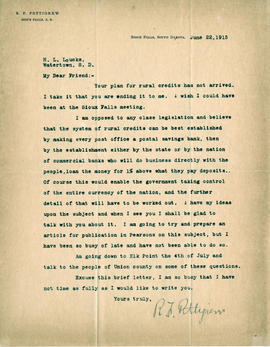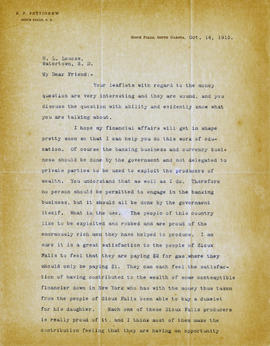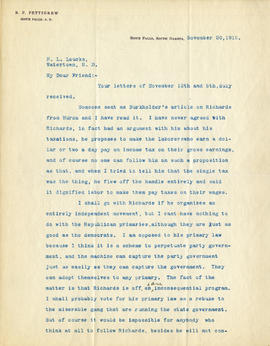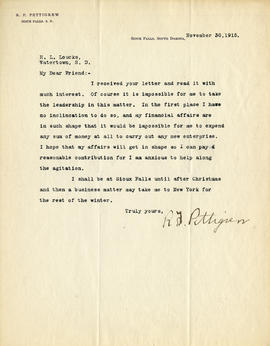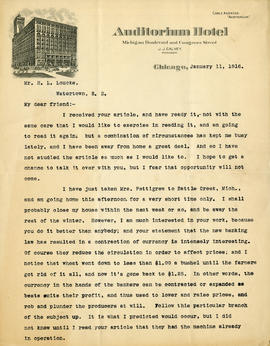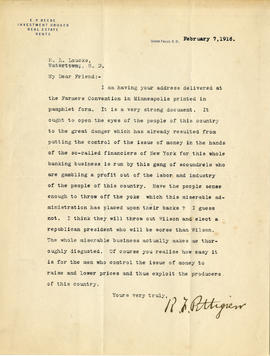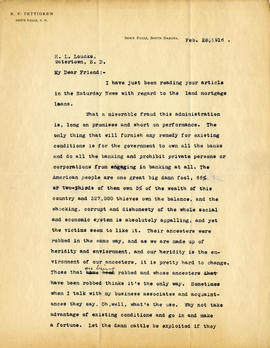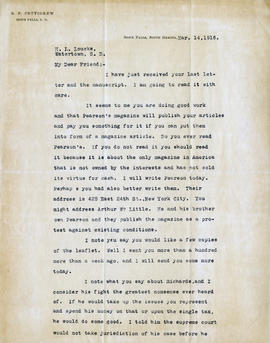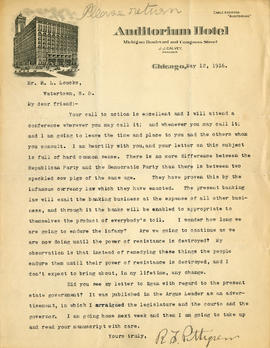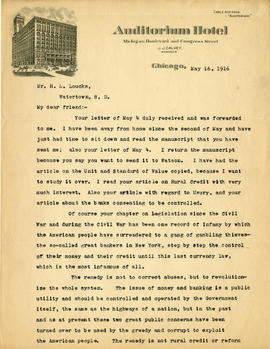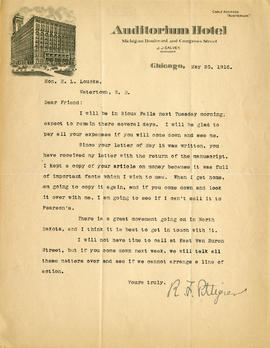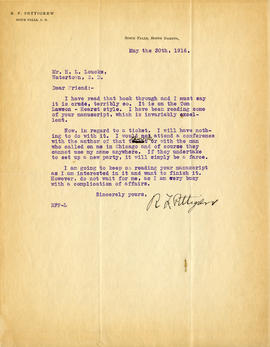Identity elements
Reference code
Name and location of repository
Level of description
Title
Date(s)
- 1914-1916 (Accumulation)
Extent
0.42 linear feet (1 document case)
Name of creator
Biographical history
Henry Langford Loucks was born on May 24, 1846, in Hull, Ontario, Canada, to William J. and Anna (York) Loucks. Educated in Canadian common schools, he married Florence Isabel McCraney on May 22, 1878, in Oakville, Ontario. The couple had seven children, four of whom—Perry, Anna, Elizabeth, and Daniel—reached adulthood.
Loucks immigrated to the United States, initially running mercantile businesses in Michigan and Missouri before settling on a government homestead in Deuel County, Dakota Territory, near Clear Lake, in 1884. Arriving as the economic boom was fading, he quickly experienced the hardships faced by local farmers. In response, he organized a "farmer’s club," which evolved into the Territorial Alliance and later affiliated with the National Farmers' Alliance in 1885. As its leader and president, Loucks championed cooperative business ventures, including fire and hail insurance and merchandising, and founded the Dakota Ruralist, a newspaper that promoted his economic views for two decades.
Initially aligned with the Republican Party, Loucks and his associates sought reform within existing political structures. However, in 1890, he was nominated for governor at a joint convention of the Knights of Labor and the state Farmers' Alliance. Though unsuccessful, he helped consolidate support for a new political movement that became the Populist Party. He presided over the first Populist Party national convention in 1892 and was elected president of the National Farmers' Alliance and Industrial Union the same year. A strong advocate for direct democracy, he played a key role in securing the adoption of the initiative and referendum in South Dakota in 1898.
Loucks authored several works reflecting his economic and political philosophies, including The New Monetary System (1893), Government Ownership of Railroads and Telegraphs (1894), and The Great Conspiracy of the House of Morgan and How to Defeat It (1916). Though he resided in Watertown, South Dakota, for many years, he passed away in Clear Lake, South Dakota, on December 29, 1928.
Name of creator
Biographical history
Richard Franklin Pettigrew was a U.S. Delegate from the Dakota Territory and later a U.S. Senator from South Dakota. Born in Ludlow, Windsor County, Vermont, on July 23, 1848, he moved with his family to Wisconsin in 1854. He attended public schools and Evansville Academy before enrolling at Beloit College in 1864. After a year of teaching and studying law in Iowa, he entered the law department of the University of Wisconsin at Madison in 1867.
In 1869, Pettigrew moved to Dakota Territory as part of a U.S. deputy surveyor team. He settled in Sioux Falls, where he was admitted to the bar around 1871 and practiced law while engaging in surveying and real estate. His political career began with service in the Dakota Territorial House of Representatives in 1872, followed by terms in the Territorial Council in 1877 and 1879.
Pettigrew was elected as a Republican Delegate to the Forty-seventh Congress (1881–1883) but was unsuccessful in his bid for reelection in 1882. He returned to the Territorial Council in 1885, continuing his involvement in legislative affairs. Pettigrew later played a crucial role in securing statehood for South Dakota and went on to serve as one of its first U.S. Senators.
A strong advocate for progressive and populist policies, Pettigrew eventually broke with the Republican Party, aligning himself with the Populist movement and advocating for economic reform and government regulation of monopolies. His political career and writings reflected his commitment to challenging corporate power and advancing policies to benefit the working class and farmers.
Content and structure elements
Scope and content
The collection consists of correspondence between Henry Langford Loucks and Richard F. Pettigrew from 1914 to 1916, primarily discussing political issues related to the progressive movement in early 20th-century America. Loucks' letters to Pettigrew span from November 1914 through July 1916, while Pettigrew’s responses cover a similar period. In addition to the correspondence, the collection includes undated photographs, editorials authored by Loucks, and a 1917 pamphlet titled Will the Farmer be the "Goat" Once More?, which addresses agricultural and economic concerns. The materials provide insight into the political discourse and reform efforts of the time.
System of arrangement
Conditions of access and use elements
Conditions governing access
The collection is open to all researchers, with materials accessible on-site only and not available for circulation.
For extensive research, scheduling an appointment in advance via phone or email is encouraged, including details about the research topic and intended use.
To access materials, researchers must complete and sign the Registration Form and provide proof of identity (e.g., University ID or driver’s license). By signing, researchers agree to adhere to the Reading Room Rules. The registration document also includes guidelines on making copies of materials, correct referencing, and copyright obligations.
Physical access
Technical access
Conditions governing reproduction
South Dakota State University supports access to its collections, both published and unpublished. However, access to certain items may be restricted due to their fragile condition, donor agreements, or copyright.
Reproduction of materials is allowed for research purposes only, and written permission is required for publication or distribution.
Due to the delicate nature of some items, reproduction may be limited.
Languages of the material
- English
Scripts of the material
Language and script notes
Finding aids
Uploaded finding aid
Acquisition and appraisal elements
Custodial history
Immediate source of acquisition
Appraisal, destruction and scheduling information
Accruals
Related materials elements
Existence and location of originals
Existence and location of copies
Related archival materials
Bibliography
H.L. Loucks
Addresses
[Watertown?, S.D.: s.n., between 1910 and 1930].
Call number: SD Collection: S561.5 .L68
Government Ownership of Railroads and Telegraph, as Advocated by the National Farmers' Alliance and Industrial Union
Huron, S.D.: s.n., 1893.
Call number: Books/Upper Level: HE1081.L6
The Great Conspiracy of the House of Morgan and How to Defeat It
[Watertown, S.D.: H. L. Loucks], c1916.
Call number: Books/Upper Level: HG2481.L6g
The Great Conspiracy of the House of Morgan Exposed and How to Defeat It
[Watertown, S.D.: The Author], c1916.
Call number: Books/Upper Level: HG2481.L6g2
How to Restore and Maintain Our Government Bonds at Par
[Watertown, S.D.: The Author], c1921.
Call number: Books/Upper Level: HJ8117.L84
The Mythical Gold Base: Or Standard of the Federal Reserve System Compared with Our Farmers’ Land Loan and Sub-Treasury Plan
[Watertown, S.D.: American Honest Money League, 1922].
Call number: SD Collection: HG2565.L6
The New Monetary System as Advocated by the National Farmers' Alliance and Industrial Union
Aberdeen, S.D.: Ruralist Quarterly, 1895.
Call number: Books/Upper Level: HG529.L6 1895
"Our Daily Bread" Must Be Freed from the Greed of Private Monopoly
[Watertown, S.D.: The Author], c1919.
Call number: Books/Upper Level: HD9036.L7
Richard F. Pettigrew
Triumphant Plutocracy: The Story of American Public Life from 1870 to 1920
Chicago: Charles H. Kerr & Co., 1922.
Call number: E661.P4t
The Course of Empire: An Official Record
New York: Boni & Liveright, 1920.
Call number: E661.P4c
Imperial Washington: The Story of American Public Life from 1870 to 1920
Chicago: Charles H. Kerr & Co., 1922.
Call number:E661.P53
Related descriptions
Publication notes
Ask Us!
If you have questions or would like to schedule a visit, please let us know.
Publication notes
Copyright and Use Statement
In Copyright This Item is protected by copyright and/or related rights. You are free to use this Item in any way that is permitted by the copyright and related rights legislation that applies to your use. For other uses, you need to obtain permission from the rights-holder(s).
Materials in this collection may be subject to Title 17, Section 108 of the United States Copyright Act. Users are responsible for ensuring compliance with copyright, privacy, trademark, and other applicable rights for their intended use. Obtaining all necessary permissions is the user's responsibility. Written authorization from the copyright and/or other rights holders is required for publication, distribution, or any use of protected materials beyond what is permitted under fair use.

